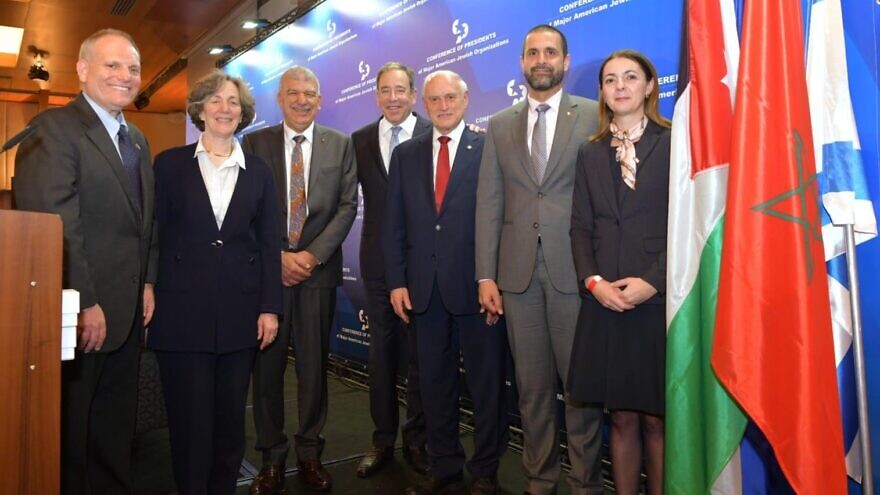The Abraham Accords are quickly proving themselves as meaningful, tangible agreements built on common national interests, defense arrangements and economic opportunities. After decades of diplomatic boycott, the accords represent rapid geostrategic normalization on multiple levels.
While the COVID-19 pandemic has limited the number of tourists visiting between the signing nations, progress has been nonetheless impressive. The accords have paved the way for business leaders between the participating nations to forge commercial deals. Yet at the center of the agreements has been notable government-to-government cooperation.
On Monday, the Conference of Presidents of Major American Jewish Organizations Leadership Mission hosted a panel bringing together several nations’ new ambassadors to Israel, who have been instrumental in the accords’ development. Participants included U.S. Ambassador to Israel Thomas Nides, Bahrain’s Ambassador to Israel Khaled Yousif Ahmed Alialahma, Morocco’s Ambassador to Israel Abderrahim Beyyoudh and Kosovo’s Ambassador to Israel Ines Demiri.
Bahrain’s Alialahma stressed that “we are very early on in this long journey to build cooperation in economic fields, government ties and beyond. The more support we receive, the more we’ll be able to achieve and the faster we will be able to achieve it. We have a long way to go.”
Morocco’s Beyyoudh noted that the Moroccan Embassy is celebrating “exactly one year in Tel Aviv.”
“I knew nothing about Israel. Since we came, you know how many people in Israel are from Moroccan origin. We have been meeting [Moroccan Jews] up and down the country,” Beyyoudh said.
He described the Moroccan Jewish community as “a foundation on which his majesty Mohammed VI has built the relationship between Israel and Morocco. He cares about the community.”
Beyyoudh said that the two countries are already cooperating in the fields to agriculture, technology and water.
Earlier in the day, Israel and Morocco signed a multilateral economic agreement; they had already signed defense agreements.
“To sign all these in one year is amazing. We are not going to stop there,” Beyyoudh said. “We are going to look for more fields of cooperation. We have a promising future.”
‘We have a very special bond’
Kosovo’s Demiri said that February is a special month for the country, which just celebrated its 14th anniversary of independence.
“The first of February is the date upon which Kosovo and Israel established diplomatic relations, and we are about to celebrate the anniversary of the opening of the embassy in Jerusalem,” she said.
She noted that during her previous four years in New York as deputy consul general, she worked with many American Jewish organizations.
“I want to thank them for their help, for the crucial role they played to bring the two countries together.”
Demiri alluded to the forward thinking of the Trump administration to incentivize normalization with Israel. “We had an economic normalization agreement with Serbia,” Demiri said. “Inside of that was recognition of Israel. I want to thank the U.S. government for making this arrangement possible.”
“Despite the challenges of starting from scratch in opening the embassy here, we have achieved so much. I am impressed and appreciate the willingness and readiness of so many Israelis to work with and learn about Kosovo. We are seeing cooperation in innovation, technology and more. We have upcoming exchange visits which will help deepen our cooperation in many fields. We expect to sign more agreements in the coming year.”
Demiri noted that Albanians and Jews “have a very special bond dating back to the 15th century after their expulsion from Spain.”
During the Second World War, Albanians helped save many Jewish people, despite the deportation of more than 250 Jews to the Bergen-Belsen concentration camp. Demiri also spoke of her own Jewish roots.
“I am proud that many Albanians are listed among the righteous among the nations for what they did to save Jewish people,” she said.
She added that Kosovo is working to promote Holocaust education and has joined the countries that have adopted the IHRA definition of anti-Semitism.
U.S. Ambassador Nides clarified that the Biden administration is fully onboard with the Abraham Accords.
“I don’t agree with everything the former administration did, but the president, Jared Kushner, David Friedman—what they did was amazing,” he said.
Nides said that it is his job to focus on “making the accords practical.” He added that the U.S. will be hosting an event at the Dubai Expo, focusing on culture, sports, food and music.
“The accords help our friends in Bahrain, UAE, Morocco, Kosovo, let us not forget Jordan and Egypt. It helps the region,” Nides said. “It makes the Middle East safer and more prosperous.”


























